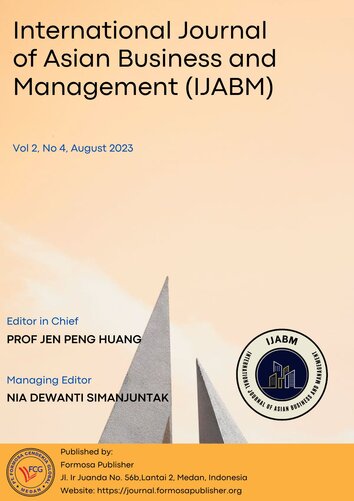The Effect of Religiusity, Literacy and Income on Zakah Awareness in Baznas Tangerang City
DOI:
https://doi.org/10.55927/ijabm.v2i4.4721Keywords:
Religiosity, Literacy, Income, Awareness, ZakahAbstract
Islamic teachings recommend zakah as a tangible kind of social protection. It can act as a means of bridging the wealth gap between rich and impoverished Muslims, as well as between muzakki and mustahik. Therefore, there is no monopoly or wealth accumulation in a small number of Muslim groups. The goal of this study was to ascertain how income, literacy, and level of religiosity affected people's awareness of paying zakah in BAZNAS Tangerang City. This kind of study employs a quantitative methodology and a survey method with 100 participants. The traditional assumption test, which comprises the normality test, multicollinearity test, heteroscedasticity test, autocorrelation test, coefficient of determination test, F test, and t test, is used in the data analysis process. Considering the testthe Coefficient of Determination's (R2) findings. As can be observed, the adjusted R square value is 67.2%. This indicates that the dependent variable's variance can be described by the independent variable in 32.8% of cases, whereas 15.5% of the variance may be explained by other factors. Additionally, the F test results show that income, literacy, and religiosity all have a substantial beneficial impact on zakah awareness, with a level of significance less than 5%. While religiosity has a strong favorable impact on zakah awareness, the t test only partially supports this. Zakah awareness is significantly influenced positively by literacy and positively by income
Downloads
References
Ancok, D dan Suroso, F. (2001). Psikologi Islami : Solusi Islam Atas Problem-Problem Psikologi. Yogyakrta: Pustaka Pelajar Anugerah Azman
Damayantie R Augustia. 2015. Literacy Dari Era Ke Era. Yogyakarta: Pascasarjana Pendidikan Bahasa dan Sastra Indonesia Universitas Negeri Yogyakarta.
Ghozali, Imam. 2013. Aplikasi Analisis Multivariate dengan Program SPSS 21. Semarang: Badan Penerbit Universitas Diponegoro.
Hafidhuddin, Didin. 1998. Panduan Praktis tentang Zakah, Infak, dan Sedekah. Jakarta: Gema Insani.
Ivalaili, I. (2019). Religiosity Dan Pengaruh Faktor Demografi Terhadap Kepatuhan Dalam Berzakah. Al-Urban, 3(1), 1-12.
Khumaini, S. (2019). Analysis of The Effect of Empowering Productive Zakah Funds on Welfare of The People. JESI (Jurnal Ekonomi Syariah Indonesia), 8(2), 81-88.
Nugroho, A. S., & Nurkhin, A. (2019). Pengaruh religiosity, income, pengetahuan zakah terhadap awarenessmembayar zakah profesi melalui Baznas dengan faktor usia sebagai variabel moderasi. Economic Education Analysis Journal, 8(3), 955-966.
Nur, M. & M. Zulfahmi. 2018. Pengaruh Pengetahuan, Income, dan Kepercayaan, Terhadap AwarenessMuzakki dalam Membayar Zakah di Baitul Mal Kota Lhokseumawe. Jurnal Ekonomi Regional Unimal, 1(3).
Salmawati, S., & Fitri, M. (2018). Pengaruh income level, religiosity, akuntabilitas dan kualitas pelayanan terhadap awarenessmuzakki membayar zakah di baitul mal Kota Banda Aceh. Jurnal Ilmiah Mahasiswa Ekonomi Akuntansi, 3(1), 54-66.
Setiawan, F. (2019). Pengaruh religiosity dan reputasi terhadap awarenessmuzakki dalam membayar zakah profesi (Studi kasus di Kabupaten Ponorogo). Jurnal Ilmu Manajemen, 8(1), 13-21.
Sumarwan, U. (2004). Prilaku Konsumen Teori dan Penerapannya dalam Pemasaran. Bogor: Ghalia Indonesia
Downloads
Published
How to Cite
Issue
Section
License
Copyright (c) 2023 Sabik Khumaini; M. Nurzansyah; Samsuri, Kamil Ali

This work is licensed under a Creative Commons Attribution 4.0 International License.



















